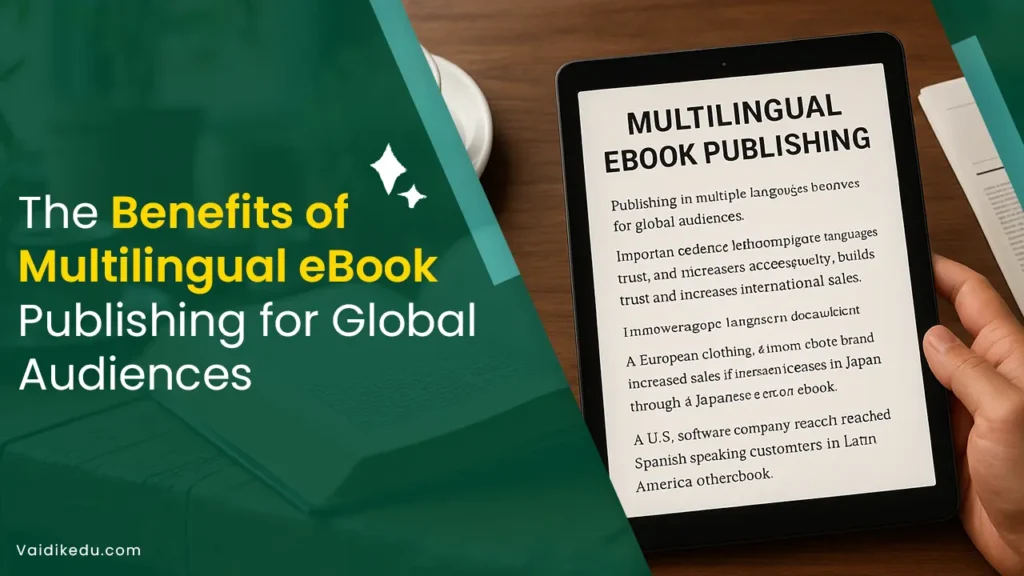There is a demand for multilingual content. This has been particular in this digital age. Irrespective of culture, its requirement is growing. The development of eBooks has aggravated the cause. It allowed authors to reach readers worldwide. This has changed how books are consumed.
The internet provides a platform for wide distribution. Multilingual eBook publishing has become very powerful. It helps break down language barriers. A publisher’s reach can be expanded in this way.
Why This is A Beneficial Strategy
- Expand The Audience
When published in different languages, the global market would rise. When an eBook is translated into different languages, the audience gets expanded. English has been the dominant language in publishing. However, this is now changing.
The growth of digital platforms is driving this change. The rise of native-language content is also contributing. Some of the common global languages are Spanish, French, Arabic, and Chinese. All these have millions of speakers. Interestingly most of them prefer reading in their native language.
Offering eBooks in these languages helps authors connect with new readers. This can increase sales. It also helps build a global fanbase. By catering to different linguistic communities, authors can access a much larger market.
- Enhance Culture
Language is closely tied to culture. A book that works in one language may not have the same impact if translated poorly. Cultural nuances must be considered. Multilingual eBook publishing allows authors and translators to adapt content. This makes it more relevant to the cultural expectations of different regions.
When a book is translated into a local language, it can include idiomatic expressions. It can reference local traditions and customs. This makes the book more appealing to the target audience.
A localized approach strengthens the emotional connection with readers. They feel that the content speaks directly to them. Multilingualism doesn’t mean a mere translation. It is about understanding the culture of the audience.
- Increase in Revenue And Market
Expanding an eBook’s reach into multiple languages leads to more revenue. Multilingual publishing can multiply sales in different regions. This drives profits in ways that a single-language approach cannot. For example, a book published in English may not do well in countries with low English proficiency.
When translated into Spanish or French, it will reach a larger audience. It will have more scope in Latin America and Europe. Also, eBooks are cheaper than paper books. Both in transportation and production, eBooks are convenient.
Any additional cost for eBooks could still be overcome with larger markets.
With platforms like Amazon Kindle, Apple Books, and Google Play Books, authors have global distribution. This minimizes geographical limitations.
- Building An International Brand
For authors aiming to build a strong international presence, multilingual publishing is key. Offering works in multiple languages helps authors gain global recognition. They can attract a diverse readership. Global visibility through multilingual publishing can help authors build credibility. This can lead to more book sales, speaking gigs, and media appearances.
Multilingual publishing can also open doors for international book deals. Authors can sell book translation rights and collaborate with foreign publishers. In today’s global literary market, having a multilingual portfolio can set an author apart. It positions them as an influential voice in the international literary community.
- Provide Easier Access To Global Readers
E- Books are designed to be easily accessible and portable. With just a few clicks, readers around the world can download books. This is very important. Especially to the readers who don’t have access to physical books.
Multilingual books allow non-English readers to access the content of their native language. There will be no issues related to poor translations. They can enjoy high-quality, localized versions of their favorite books. This improves their reading experience.
E- Books are accessible on almost all devices. People can read it on smartphones, tablets, laptops etc. Hence a wider audience can access the same content. The ability to instantly purchase and download eBooks is a huge advantage.
This is particularly important in countries where physical book distribution is limited or expensive.
- Enhance Visibility in Search Engines
Search engine Optimization is a very important tool. It determines how a term or content comes up on search engines. So for eBooks, SOP is very crucial. When a book is multilingual, the SEO ranking will be improved. This helps it reach a wider audience. It also taps into language-specific search queries.
Offering eBooks in multiple languages helps target search keywords in various languages. This makes content discoverable by readers around the world. For example, a book in English may be searchable with English keywords.
But what about the millions of Spanish-speaking readers using different search terms? Translating the book into Spanish targets Spanish-language search terms. This increases visibility on platforms like Google and Amazon.
- Use The Growth of Digital Books
eBooks are becoming very popular. More readers are choosing digital formats. They prefer digital reading because it is convenient and affordable. Digital reading is especially popular in emerging markets. Digital reading is mainly done through smartphones. With a stable internet connection, the eBook popularity keeps on growing.
This shift creates an opportunity for multilingual publishing. Authors can offer content in different languages. This meets the growing demand for digital books. Areas like Southeast Asia, Africa, and Latin America have high potential. These regions are still untapped for eBook sales.
Multilingual publishing is an important strategy for authors and publishers. It helps them take advantage of this global trend.
- Develop Global Collaborations
Multilingual eBook publishing helps build relationships with international publishers. It also connects authors with agents and distributors. As publishers expand into new markets, multilingual content becomes more valuable.
Translating eBooks into different languages opens new opportunities. Authors can collaborate with foreign authors and organizations. These international partnerships can lead to joint marketing and co-authorships. They also allow for cross-promotions. Such collaborations help extend an author’s reach.
Conclusion
The benefits of multilingual eBook publishing are clear. Offering eBooks in different languages helps authors and publishers. It allows them to expand their audience. They can increase their revenue. It also creates cultural connections. Authors can build an international brand.
In today’s digitally connected world, multilingual publishing is essential. It helps reach global readers. As the eBook market continues to grow, multilingual publishing will become even more important. It will be key to success in the global literary world.
Frequently Asked Questions
It is a process of translating and distributing eBooks. The specialty is that it is translated into many different languages at once. This helps authors reach readers from different countries and cultures.
This helps in expanding the audience. Here, the book becomes accessible to people who speak different languages. It will result in more sales. So authors can get greater profit and exposure.
It is greatly useful for people who like to read in their native language. Also, authors can connect with global audiences better. They could recognize different cultures as well.
Readers can read the books in their native language. Their reading experience will be made more pleasant. Some places might have shortages of physical books. In those places, this type of publishing would become handy.









